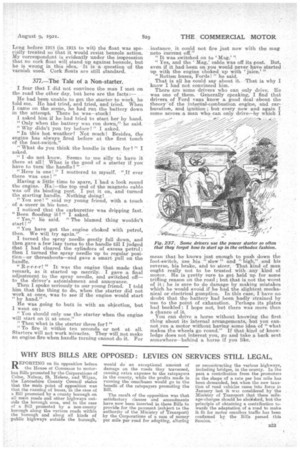WHY BUS BILLS ARE OPPOSED: LEVIES ON SERVICES STILL LEGAL,
Page 29

If you've noticed an error in this article please click here to report it so we can fix it.
REPORTING on its opposition before the House of Commons to motorbus Bills promoted by the Corporations of Colne, Nelson St. Helens, and Wigan, the Lancashire County Council states that the main point of opposition was that the running of buses, in the case of a Bill promoted by a county borough on all main roads and other highways outside the borough area, and in the case of a Bill promoted by a non-county borough along the various roads within the borough and along all kinds of 'public highways outside the borough,
would do an exceptional amount of damage on the roads they traversed, causing extra expense to the ratepayers in the county, while the profits made in running the omnibuses would go to the benefit of the ratepayers promoting the Bill.
The result of the opposition was that satisfactory clauses and amendments have now been inserted in the-se Bills to provide for the payment (subject to the authority of the Ministry of 'Transport) by the Corporations of a sum of money • per mile per road for adapting, altering
or reconstructing the various highways, including bridges, in the county. In the past a contribution from the promoters in the shape of a rate per bus mile has been demanded, but when the new taxation of road vehicles came into force in January last it wfs considered by' the Ministry of Transport that these mileage,charges should be abolished, but the principle of obtaining a contribution towards the adaptation of a road to make it fit for motor omnibus traffic has been confirmed by the Bills passed this
Session. •
































